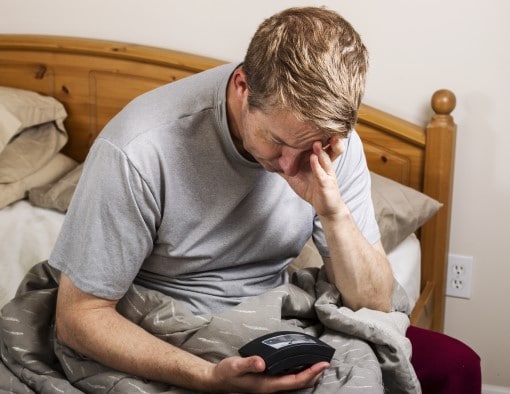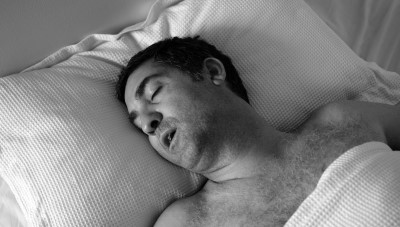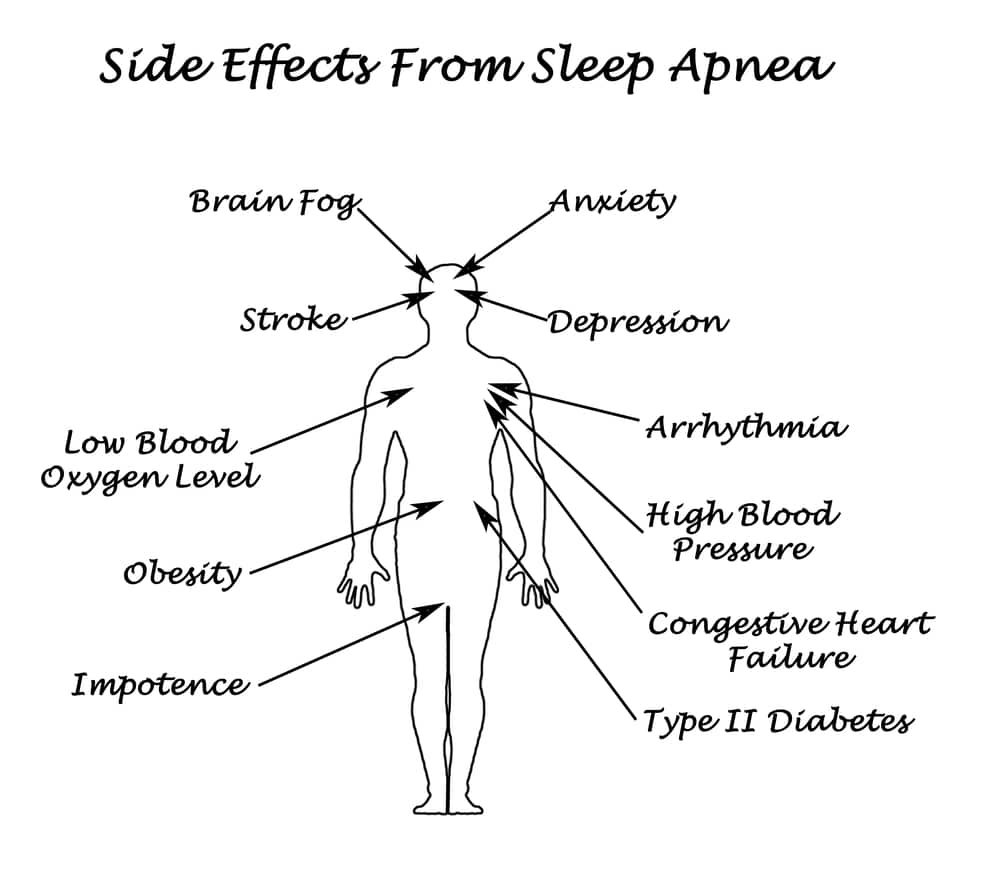
Sleep apnea and other things you didn’t think of could be why you’re waking up so much to go to the bathroom
By Jason Wooden, PhD | April 21, 2020
Waking up too much to go to the bathroom during the night can be incredibly frustrating. One in three adults older than age 30 make at least two trips to the bathroom during the night.
There are many different causes including lifestyle factors, diet, medications, other medical conditions, and sleep apnea. In this article, we list the things to check for and your options to avoid excessive bathroom wakeups.
Are you tired from repeated calls of nature interrupting your sleep at odd hours to go to the bathroom?
You’re not alone.
Unfortunately, waking up too much to go to the bathroom is an all too common problem.
One in three adults older than age 30 make at least two trips to the bathroom every night.
In a 2003 Sleep in American poll, 65% of adults age 55-85 said they needed to get up to the bathroom a few nights a week or more. For women over age 30, a full bladder wakes up 2 in 3 of them at least once a night.
Regular night time wake-ups to urinate, also known as nocturia, is a common contributor to poor sleep for many adults.
It can disrupt your sleep cycle and keep you from getting the deep restful sleep experts say our bodies need to recover.
And whether it’s in the middle of the night or way too early before an alarm clock goes off, it’s all the same…you wake up feeling behind the eight ball and not ready to face the new day.
If this is you, good news – we know why it happens and there’s lots you can do to keep from waking up too much to go the bathroom.
How many times is normal to urinate at night?
According to the National Sleep Foundation, people without nocturia are able to sleep for 6 to 8 hours without having to go to the bathroom.
Even if you have to get up once during the night, that’s still considered to be within normal limits.
It’s when you have two or more awakenings to go to the bathroom that you’re thought to have nocturia. That’s because it disrupts your sleep cycles and leaves you feeling unrested in the morning.
And for some people with severe nocturia, they may wake up as many as five to six times for bathroom trips.
What causes people to wake up to go to the bathroom
There’s a reason so many people are affected by nocturia. That’s because there are so many different things that can cause you to wake up for a bathroom trip.
Possible causes include:
Drinking too much – consuming too many fluids can come back to bite you during the night.
Caffeine and alcohol – even during the day, they can result in frequent trips to the bathroom, so no surprise it does the same at night. Alcohol can also cause your sleep to be more shallow.
Stress and restlessness – there’s a strong link between sleep and stress. If you’re over-anxious and mentally strung out, it can put your body into a stress response where you’re more prone to awakenings.
Pregnancy – it’s not uncommon for expecting moms to have to pee more often during the night.
Age – as you get older, your body make less of a hormone that allows you to retain fluid. Older people also tend to lose holding capacity and are more likely to have bladder issues.
Bladder or urinary tract infections – it’s not uncommon for people to feel a strong and frequent need to urinate.
Underlying health issues – nocturia is often a symptom of other medical issues. There’s a long list:
- kidney problems
- diabetes
- enlarged prostate
- heart disease and heart failure
- high blood calcium levels
- high blood pressure
- liver failure
- sleep disorders such as restless leg syndrome
Medications – certain prescriptions including diuretics, lithium, muscle relaxants and excessive vitamin D can cause nocturia.
Sleep apnea could be why you’re waking up to go to the bathroom
It happens when the muscles in the throat relax too much during sleep which collapses the airway and interrupts breathing.
As you become more oxygen-derived, your brain arouses you out of deep restorative sleep into a lighter sleep. In the morning, you wake up feeling as if you haven’t slept at all.
The symptoms include:
- loud snoring
- pauses in breathing while asleep
- choking, gasping or snorting sounds
- dry mouth or sore throat
- difficulty staying asleep
- morning headaches
- daytime fatigue
- irritability or mood swings
- attention, memory, or learning problems

Nocturia is also a common sleep apnea symptom. In one research study, 84% of patients with sleep apnea reported excessive night time trips to the bathroom.
Sadly, many people are living with undiagnosed obstructive sleep apnea and are probably unaware of how it’s wrecking their sleep.
How to avoid excessive night time visits to the bathroom
Okay, now we finally get to the good stuff, all the things you can do to keep from waking up too much to go the bathroom.
Depending on how serious your situation is, you may want to see a doctor to get a diagnosis for nocturia. They will ask about your symptoms and check for various causes.
Your doctor may ask you to keep a diary to track your bathroom visits and sleep. They can also do specific tests to check things like your urine, kidney function, and bladder.
There’s a wide range of remedies for nocturia depending on what’s causing your night time wake ups.
1) Watch your fluid intake
This one is pretty straightforward. Experts suggest you get plenty of fluids during the day but limit them in evening before bedtime.
2) Dietary changes
Avoiding caffeine and alcohol in the evening is pretty obvious. You may also need to stay away from foods rich in diuretics such as melon, celery, cherry, cranberry, citrus, cucumber, pomegranate, and tomato.
3) Behavioral modifications
How about an afternoon nap? It can help reduce fluid buildup in the body since it stimulates you to eliminate excess urine once you wake up. Elevating your legs and compression stockings can help the body redistribute fluids so that they’re reabsobred into the bloodstream.
4) Quit smoking
Smoking irritates the bladder and lead to more frequent bathroom trips. Learn more
5) Weight loss
You want to try losing some pounds. Obesity has been found to be strongly associated with nocturia in studies.
While the connection is not well understood, researchers suspect that the extra weight can cause your body to make more urine or urinate more often.
6) Check your meds
Your doctor can help you figure out if any of your meds have diuretic or other side effects linked to nocturia.
7) Check for sleep apnea
Are you one of the millions of people living with undiagnosed sleep apnea? If you suspect you have the any of the symptoms, get in and see a sleep specialist ASAP.
Is CPAP not working for you? There are plenty of alternatives these days, including innovative body positioners and pacemaker-like devices.
It’s important to get your sleep apnea under control to avoid night time bathroom visits and the many other serious health downsides associated with it. (It’s linked to high blood pressure, heart disease, stroke, diabetes, and depression!)
A recent study found that reducing obstructive sleep apnea helped reduced night time bathroom trips.

8) Check for other underlying health conditions
I’ve already mentioned the long list of medical issues that can cause you to wake up to go the bathroom. That makes it important to see a doctor and get treated.
9) Medications
Depending on your situation, there are various medications that may help. Some may help the kidneys make less urine while other may help with bladder muscle problems. Learn more
Natural remedies to avoid excessive night time bathroom trips
There’s a variety of drug-free options that may help with nocturia:
Foods: We’ve talked about which ones to avoid, but there are some that may help including raisins, pumpkin seeds, and grapefruit juice.
Herbs and supplements: Some traditional herbal extracts and supplements have been found in studies to help.
Acupuncture: It’s been shown to help with some nocturia patients.
If you want to try any of these remedies, it’s important to get help from an alternative medicine specialist such as a naturopathic physician.
You may also be interested in:
Sources:
1. Nocturia, Stephen W. Leslie; Vincent D’Andrea; Hussain Sajjad; Shashank Singh.
2. Frequent Urination at Night, National Sleep Foundation website
3. “Full bladder wakes 2 in 3 women at night”, 2014, Harvard Health Publishing website
4. Nocturia in Older Adults: Highlighting Nocturnal Polyuria, US Pharm. 2017;42(8)
5. “What Is Nocturia”, National Association for Continence website
6. “Medications that can cause urinary incontinence”, 2019, Harvard Health Publishing website
7. “Sleep Apnea Information for Clinicians”, American Sleep Apnea Association website
8. Estimation of the global prevalence and burden of obstructive sleep apnoea: a literature-based analysis, Lancet Respir Med. 2019 Aug;7(8):687-698.
9. “Night time urination and sleep apnea”, American Sleep Apnea Association website
10. The Association Between Obesity and the Nocturia in the U.S. Population, Int Neurourol J. 2019 Jun; 23(2): 169–176.
11. “Does disturbed breathing while asleep make some people urinate more at night”, 2017, ScienceDaily.com
12. Treatment of Nocturia Symptoms With Acupuncture, Acupunct Electrother Res. 2013;38(3-4):199-210.
Connect with us:
About Us
Better Sleep Simplified® was founded as a place for you to get clear and well-researched information.
Our goal is to make sure you know about your options so that you take action sooner rather than later.
Check us out on YouTube:
Watch and Learn
Helpful sleep tips, interesting sleep facts and statistics you want to know about
Affiliate Disclosure
This site is a participant in the Amazon Services LLC Associates Program and other affiliate advertising programs designed to provide a means for sites to earn advertising fees by advertising and linking to them.
Important: BetterSleepSimplified.com is for informational purposes only and is not intended or implied to be a substitute for professional medical advice, diagnosis, or treatment. Always consult a physician for sleep and health concerns. See additional information.
